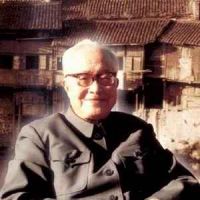Shen Congwen
Shen Congwen (沈从文) is the alias of Shen Yuehuan(沈岳焕), a famous Miao Chinese writer and historian in the 20th century. He is best known for his novels depicting the landscapes, folk and rural culture of his native Hunan Province. Much of his writing, concentrating on the difficult suburban life during China's painful transformation in the early 20th century, usually end with his simple and sincere outlook for a bright future. His straightforward and simple style was so influential that he was dubbed the "Father of China’s Countryside Literature."
Shen was born in 1902 to a rural family in the famous scenic Phoenix Town, Hunan, He joined a contingent of local troops when he finished school in 1918. Traveling with the contingent, which usually stationed at the borders of Hunan, Sichuan and Guizhou provinces, Shen witnessed endless border conflicts and the lives of Miao tribesmen.
Shen soon grew tired of corruption riddling the military and left the army. He moved to Beijing, where new thoughts and vernacular cultures boomed after the May 4th Movement. He failed the entrance exams to Beijing's universities but was encouraged by famous writers Yu Dafu and Xu Zhimo to being writing himself. In 1924, "the Beijing Morning Post" began publishing his works in its literary supplement.
His most prolific years were the early 1930s, during which time his writing style began to mature. Some of his best-sellers from this period include "A Pebble-Carrying Punt," "Moonlit Scenes," "Eight Noble Steeds" and "The Border Town." "The Border Town" is a tragic romance about a ferryman's granddaughter who lives a poor but simple life.
During the Anti-Japanese Aggression War (1937-1945), he went to Yunnan Province via Wuhan and Changsha. On that trip, he finished another highly-recommended novel, "Long River." The story again covered the rustic life in western Hunan in which a complexity of feelings towards the rumored "new life" was revealed.
He suffered a breakdown in 1949 and shifted his interest from writing to antique research, focusing on ancient Chinese fashion at the Museum of Chinese History and the Palace Museum. He never wrote another work of fiction. In 1980, he toured the United States and gave lectures.
He died in 1988 in Beijing.
"I have crossed numerous bridges located in different places, watched countless clouds and drunk various wines, but only loved once a woman at her best age."— one of the most famous excerpts from Shen’s works.
